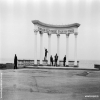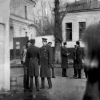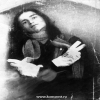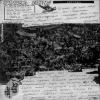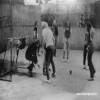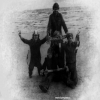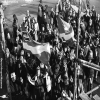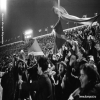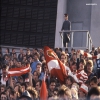
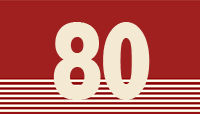
Funs
|
The movement was born in the late 70-s and comprised “kuzmichi” (ordinary stadium visitors) and field elite, escorting the teams to out-games in other towns, but by the early 80-s it found its district leaders, overgrew with gangs, merchandise and turned into the football-related communication. After a quick start of Spartak fans (the most popular hangout place of the early 80-s was taproom “Sayans” on Shchelkovskaya metro station), who were conducting street actions and parades, other teams also quickly got their “gangs”. In the early 80-s even a children’s comic magazine “Yeralash” (Mess) couldn’t ignore this phenomenon, making a parody of Rifat’s gang action called “Watercolour”, when in a day many houses were signed with Spartak symbolics. The emergence of opposition in form of “Army” and “Zenith” fans soon led to the development of slang, field folklore and naturally to showdown between coalitions in the football-related circles. “Meat”, “horses”, “bags”, “topknots”, “litvaks” – this is just a short list of offensive labels given to each other by the contending parties, whose religion now was not only football but hockey as well. Showdown in form of pogroms and multiple clashes in the early 80-s made adjustments to the unwritten rules of behavior and by 1983 actually split the ranks of fans. Now there was a close-cut separation of “left” and “right” fans, the ones kept a certain style while the others had a bent for openly disruptive behavior. By 1984 the activity of these groups led to certain pressure by the authorities, who prohibited to bring fans’ attributes to the stadiums and put on the list the most odious members of this movement. It was during this time that many ex-fans changed their religion from sport-related to melomaniac and joined the ranks of subcultules of different kind. The situation thawed in 1987, what led to a new wave of fanaticism. Instead of “gangs” appeared “firms”, the merchandise changed (instead of hand-knitted and soviet attributes appeared trademark ones and ordered in Poland and Turkey), the first “zines” started to appear, and soon the range of travelling groups extended over the USSR borders. At the turn of the 90-s in the period of fusion of the subcultural styles the recruits tired with music-fan playing joined the ranks of the sport-related movement.  go back to "Street Styles" go back to "Street Styles" |

